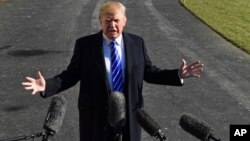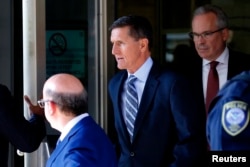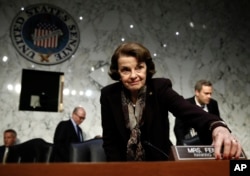U.S. President Donald Trump says it "seems unlikely" that he would need to meet with special counsel Robert Mueller about Mueller's investigation into allegations that Trump's presidential campaign had ties with Russia.
Trump made the comment Wednesday during a news conference after a meeting with Norweigian Prime Minister Erna Solberg.
He reiterated his statement that there was "no collusion" with Russia, adding, "It seems unlikely that you'd even have an interview."
"There is collusion, but it's really with the Democrats and the Russians," he said, adding, "the witch hunt continues."
Mueller has reportedly indicated to Trump's lawyers that his team would like to interview the president as part of the investigation. Trump has called the investigation a "Democratic hoax."
So far, the investigation has resulted in the indictment of former campaign chairman Paul Manafort, and a guilty plea from former National Security Advisor Mike Flynn.
Mueller's team has interviewed a number of Trump aides, including Trump's son-in-law, Jared Kushner, and former Chief of Staff Reince Priebus.
Earlier Wednesday, Trump called the investigation "the single greatest Witch Hunt in American history."
Trump also assailed California Democratic Senator Dianne Feinstein, calling her "sneaky" because on Tuesday she released a transcript of an August interview with the head of a firm that produced a dossier containing allegations about Trump's presidential campaign and Russia.
Glenn Simpson, co-founder of the research group Fusion GPS, said he gave the dossier about Trump to the FBI because he was "very concerned" about a potential national security matter. Feinstein released a lengthy transcript of Simpson's testimony without telling the majority Republican bloc on the committee.
Feinstein said Simpson requested the transcript of his testimony be released to the public and that the American people deserved the chance to see his words and judge for themselves.
Simpson's firm hired Christopher Steele, a former British spy, to produce the dossier, and that research was paid for by Democrats, including the campaign of Trump's election opponent, Hillary Clinton.
Trump has dismissed the dossier and repeatedly denied that his campaign colluded with Russia. Trump has contended that the investigations are an excuse by Democrats to explain his upset win over Clinton, a former secretary of state.
Judiciary Committee Chairman Charles Grassley, an Iowa Republican, objected to Feinstein's release of the testimony. A Grassley spokesman, Taylor Foy, called Feinstein's actions "confounding" and said she had undermined the committee's "ability to secure candid voluntary testimony relating to the independent recollections of future witnesses."
The committee is conducting one of several investigations into Russian influence on the 2016 presidential election and possible connections with the Trump campaign.
U.S. intelligence agencies assessed last year that Russia had conducted a campaign targeting the election with the goal of hurting Clinton's chances of winning while boosting Trump.
In addition, Mueller is investigating whether Trump obstructed justice by firing former FBI chief James Comey when Comey was heading the agency's Russia probe before Mueller was appointed to take over the investigation.







